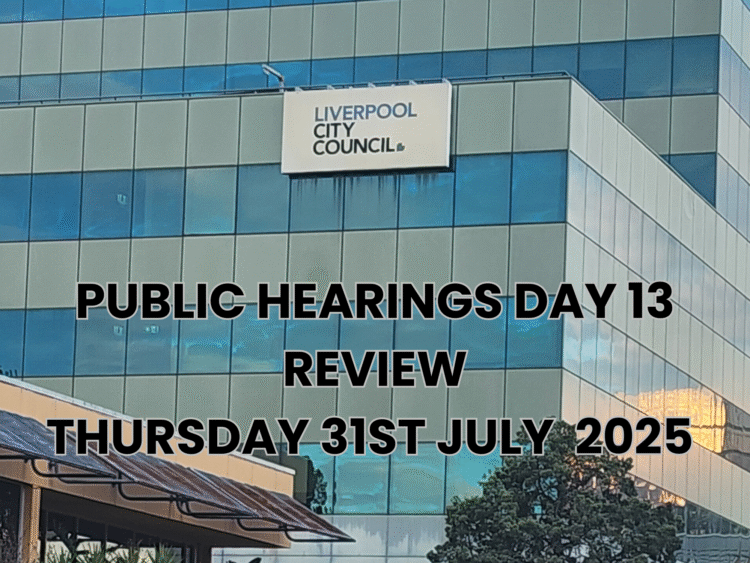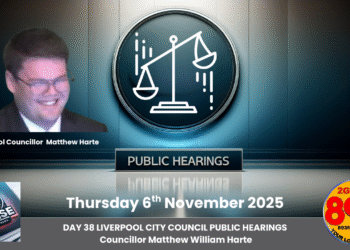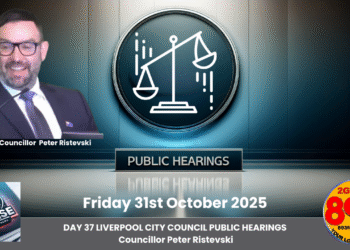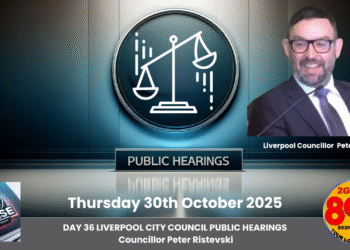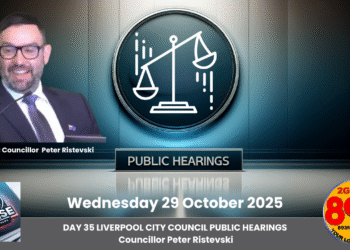Mr Mallard’s testimony on Day 13 focused on his extensive background in local government and his specific roles at Liverpool City Council, providing context for his involvement with key figures and political dynamics during his tenure. Summarised below are the critical points below, highlighting concerns for ratepayers.
Mr Shayne Mallard, currently unemployed after being made redundant from Liverpool City Council recently, shared his professional history. A graduate of Macquarie University in political science and Australian history, Mallard served as an elected councillor from 2000 to 2012, first with South Sydney Council and then with the amalgamated City of Sydney Council. During this time, he chaired finance, property, and tenders committees and was a member of planning and development committees, including the Central Sydney Planning Committee for high-value CBD developments. From 2012 to 2014, he worked as a senior advisor to the CEO and Mayor at Liverpool City Council, before leaving to successfully campaign for a seat in the Upper House of Parliament in 2015, where he served for eight years.
For Liverpool ratepayers, Mr Mallard’s extensive experience in local government and political roles raises questions about how his insights and past decisions might reflect on current council challenges. His background suggests a deep understanding of council operations and political dynamics, which could provide valuable context for governance or financial issues under scrutiny in this inquiry. However, as ratepayers, we need to ensure that past affiliations or political ties do not bias perspectives on how our rates are managed today, prioritising community needs over historical or partisan influences.
Role as Senior Advisor at Liverpool City Council (2012-2014)
During his time at Liverpool City Council from 2012 to 2014, Mr Mallard served under Mayor Ned Mannoun during a period when the council had a majority of Liberal councillors, including Tony Hadchiti, Gus Balloot, Sabrina Mamone, Mazhar Hadid, and Peter Ristevski, alongside Labor representatives like Wendy Waller, Ali Karnib, Anne Stanley, and Geoff Shelton, and one Independent, Peter Harle. Officially, Mallard reported to a director (initially Billie Sankovic) and later to CEO Farooq Portelli, though he described his role for public consumption as an advisor to both the CEO and the Mayor. He worked closely with Mayor Mannoun, eventually being physically located near the Mayor’s office in Moore Street, in a breakout office where he could observe access to the Mayor’s suite, though not within it. He was the sole person in an advisor role at that time.
As ratepayers, the close working relationship between Mr Mallard and Mayor Mannoun, coupled with his physical proximity to the Mayor’s office, raises concerns about the potential for political influence over administrative decisions during his tenure. While Mallard clarified that he reported through official channels (director or CEO), the intimate advisory role to the Mayor suggests a dynamic where political priorities could have shaped council operations. For us, this risks our rates being directed by political agendas rather than community needs, especially in a council with a clear partisan majority, potentially affecting impartial service delivery across our suburbs.
Connection to John Ajaka and Political Career
Mr Mallard also discussed his connection to John Ajaka, a previous witness in the inquiry, during his time in the Upper House. As part of a small Coalition team, he worked closely with Ajaka, initially when Ajaka was a minister, and later when Ajaka became President of the Upper House. Mallard was appointed as a temporary chair of committees (a deputy president role) by Don Harwin and continued in this capacity under Ajaka’s presidency, alongside a few other members with the same title.
For Liverpool residents, Mallard’s political connections, particularly with John Ajaka (who testified earlier about his CEO role at the council), highlight a network of relationships that could influence council governance. As ratepayers, we must consider whether such ties impact decision-making or leadership transitions at the council, potentially prioritizing personal or political alliances over the best interests of our community. With a budget over $530 million, we need assurance that our contributions fund decisions based on merit and public good, not entrenched networks.
As ratepayers in Liverpool, Day 13’s testimony from Mr Shayne Mallard brings to light potential concerns about political influence and historical dynamics within our council. His close advisory role to Mayor Mannoun during 2012-2014, combined with a council dominated by a Liberal majority, suggests a risk that political priorities may have overshadowed community-focused governance. For us, this raises doubts about whether our rates were always allocated to serve our needs or if they were swayed by partisan interests during that period, potentially setting precedents for current challenges.
Additionally, Mallard’s political connections, including with John Ajaka, underscore a web of relationships that could affect impartiality in council leadership and decisions. As ratepayers, we deserve a council where governance is transparent and driven by community benefit, not by historical ties or political affiliations that might divert our $530 million budget from essential services like infrastructure or community programs across our region.
Don’t forget to tune into 89.3 every Thursday at 9am with Michael and BJ on The Pulse for the latest local news and updates on these hearings.









